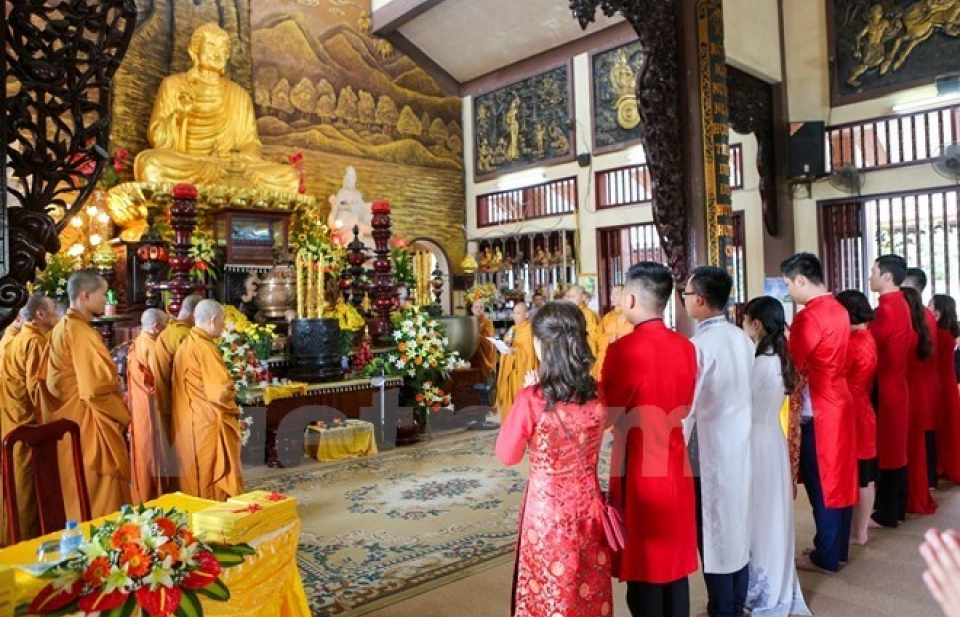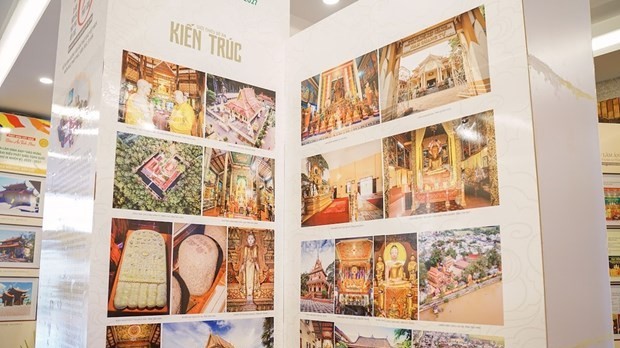
The University of Wisconsin's research team explores the application of Buddhist ethics in corporate culture at Diligo
Latest
As part of their research, the team selected Diligo Corporation, known for incorporating the Buddha's teachings on the law of karma and the five foundational ethics of "Kindness and Compassion" into its business practices and corporate culture.
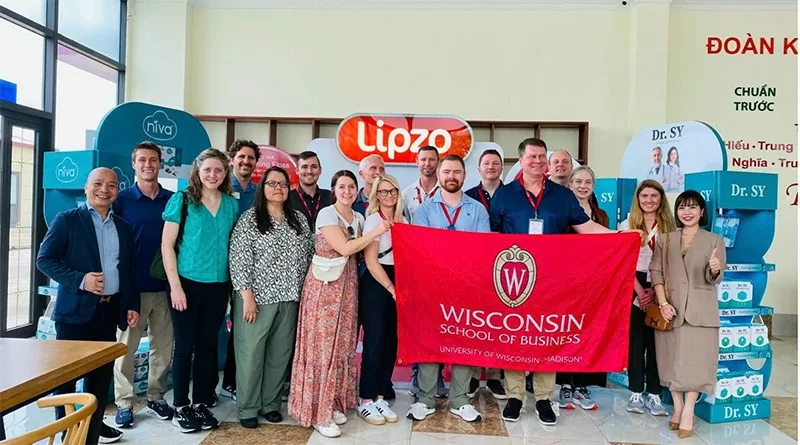 |
| The research delegation at Diligo Factory |
At Diligo’s headquarters and factory in Hanoi and Bac Ninh, CEO Vu Duc Sy shared how applying Buddhist teachings has transformed employee mindsets and behaviours, fostering a corporate culture oriented toward sustainable development. According to him, the company’s business model is built on an eight-principle foundation, including Core values in company culture, Employee development, Product portfolio, Distribution channels, Supply chain management, Technology integration, Financial control, and Public relations form.
CEO Vu Duc Sy shared his reflections: “As a young man, I dreamed of studying and living in the U.S., believing it was a paradise where the ‘American dream’ awaited. However, when I went there, I realized things were not as I had imagined. He runs a nearly hundred-million-dollar supply chain business for the nail and beauty industry in Edison, New Jersey, and faced immense sorrow when his wife died from breast cancer. Witnessing him constantly travelling between New Jersey and New York for her treatment, I felt his pain and helplessness. Through research, I found that around 2.3 million new cancer cases are reported in the U.S. each year. Although Americans often go to the gym, many who suffer from strokes, diabetes, or cancer are frequently overweight and unhealthy, mainly due to diets heavy in industrial fast foods.
While living in the U.S., I found myself adopting a Western lifestyle that brought on severe stress, leading to a range of health issues—obesity, fatty liver disease, sinusitis, mild haemorrhoids, and most notably, mental health struggles like irritability and anger. I felt increasingly unhappy and unstable in every aspect of life: my thoughts, spirit, health, family harmony, children's futures, time, relationships, work, money, and finances. Reflecting on my childhood, I remembered the peace I felt at the temple with my grandmother under the jackfruit tree. This memory inspired me to study the original teachings of Buddhism from Siddhartha Gautama, seeking guidance and stability.
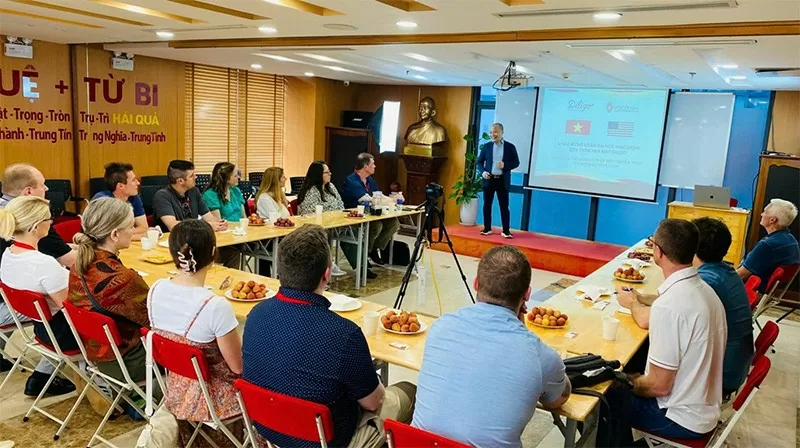 |
| CEO Vu Duc Sy sharing the law of karma and ethical foundation of "Wisdom and Compassion" at Diligo Corporation |
The Buddha teaches that proper ethics lie in causing no suffering to oneself, others, or any living beings. This principle embodies genuine love, happiness, and compassion for all sentient beings. He presented the Four Noble Truths as the foundation of human existence and the Eightfold Path as a practical guide to end suffering. Life, he explained, inherently brings four inevitable sufferings: birth, ageing, sickness, and death. By mastering and transcending these sufferings, we can move towards liberation. Buddhist teachings allow us to transform our karma, guiding us from suffering to liberation, discord to harmony, cruelty to kindness, deceit to honesty, hatred to love, resentment to forgiveness, and fear to peace. Through the Buddha’s wisdom of Precept, Concentration, and Insight, we can completely transform our lives by deeply understanding human existence beyond the need for offerings or prayers.
Life is a journey everyone shares, and we ultimately reap what we sow: good deeds yield positive outcomes, while harmful actions lead to suffering. Through studying the ethical wisdom of the Buddha, I realized that missing the opportunity to learn Buddhism within one’s lifetime is a profound loss, regardless of social standing.
After six months of dedicated practice, I experienced transformative results—my physical and mental ailments vanished, I felt rejuvenated, and my family life flourished. Those around me, including my family and colleagues, noticed the positive changes, bringing joy and harmony to our relationships.
I understood that suffering is primarily self-created; it’s as if we’re bound by invisible ropes that we struggle to break free from. From my journey, I’ve learned that people are both the foundation and outcome of development. For businesses and individuals alike to grow sustainably, they must embrace “the humanistic ethics of the Buddha.”
At Diligo Corporation, we practice and apply five ethical principles from the Buddha's teachings, guided by the belief that “Ethics means living without causing suffering to oneself, others, or any living beings,” which brings true love and happiness. These principles include: 1. Compassion Practice: Respecting all forms of life, from oneself and others to all living beings, we uphold the virtue of protecting life by refraining from killing for food or business purposes while encouraging a vegetarian lifestyle. 2. Abandon Greed: We practice contentment by refraining from greed, theft, and corruption and taking what is not freely given, fostering a spirit of generosity. 3. Loyalty in Love: Committed to the sanctity of relationships, we maintain family trust and respect by remaining faithful to one’s spouse and cultivating kind thoughts, words, and actions. 4. Honesty: We value truthfulness, avoiding lies, harmful language, and words spoken in anger. We speak with kindness and integrity. 5. Clarity of Mind: We practice mindfulness and self-control, avoiding alcohol, gambling, smoking, or substances that cloud the mind or impair memory, aiming to live with awareness and presence. Through these principles, we aim to build a corporate culture grounded in kindness, integrity, and respect for all life”, CEO Vu Duc Sy shared.
Thanks to these ethical principles, many employees at Diligo have entirely transformed their lives, breaking free from substance dependencies and harmful habits to become dedicated family members. By overcoming addictions to alcohol, drugs, and gambling, they have restored stability and health to their families. This transformation has empowered them to support their loved ones better, creating a positive environment for parents, spouses, and children and transforming their karma from suffering to happiness. Many employees have expressed deep gratitude toward the leadership and business owners, who exemplify these ethical principles through their actions. They now view Diligo as a second family, caring for the company’s assets with diligence and honesty, free from greed and negativity.
At Diligo, we live with wisdom, compassion, talent, and genuine love, striving for true happiness. We prioritize a balance of mental and physical health, cultivating a workplace free from smoking, anger, resentment, or negative emotions. This supportive and harmonious environment has proudly earned Diligo a place on the shortlist for the Asia Pacific Enterprise Awards (APEA) 2023
Following CEO Vu Duc Sy’s insightful sharing and their visit to Diligo’s headquarters, the research delegation from the University of Wisconsin was deeply impressed by this exceptional corporate culture, regarded as a global benchmark. The company promotes mindful living and vegetarianism while its facilities are meticulously maintained, creating a healthy environment. Diligo employees demonstrate a spirit of harmony, ethics, and cooperation, contributing to a unique, positive, and human-centred workplace.
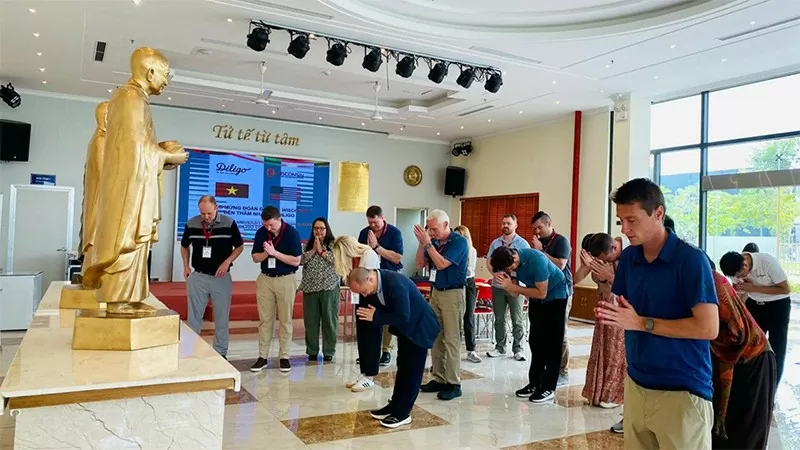 |
| The research delegation respectfully bow down to the Buddha and the elder Thich Thong Lac |
Professor Randall B. Dunham, on behalf of the research delegation, expressed deep respect for the teachings of the Buddha and heartfelt gratitude to Diligo for their warm hospitality and the valuable insights shared during their research and study in Vietnam. He emphasized that the delegation recognized the importance of Eastern cultures, particularly Buddhist principles, which the West could greatly benefit from incorporating into business practices. The professor also shared his intention to research and translate Diligo's unique cultural model into English so that he could teach and share it with American businesses.
In addition to their research on Diligo’s business culture, the team also visited the company’s production facilities. Below are photos taken during the factory tour, showcasing the team’s experience and insights gathered throughout their visit.
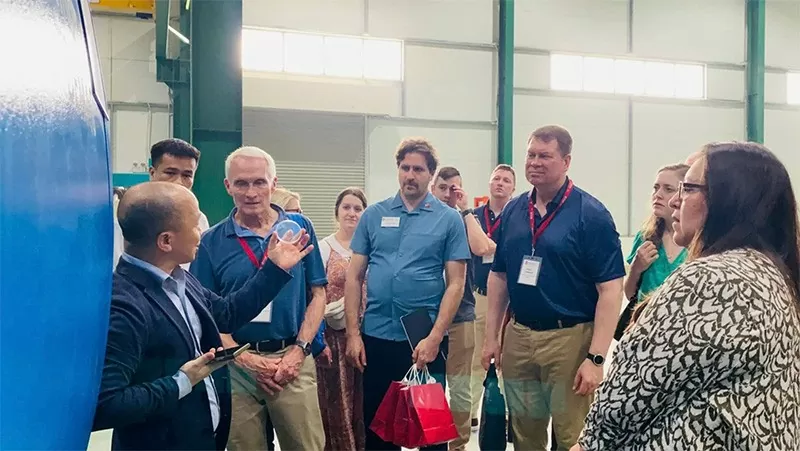 |
| Wisconsin’s researchers visit Lipzo toothpaste & Lipzo toothbrush production area |
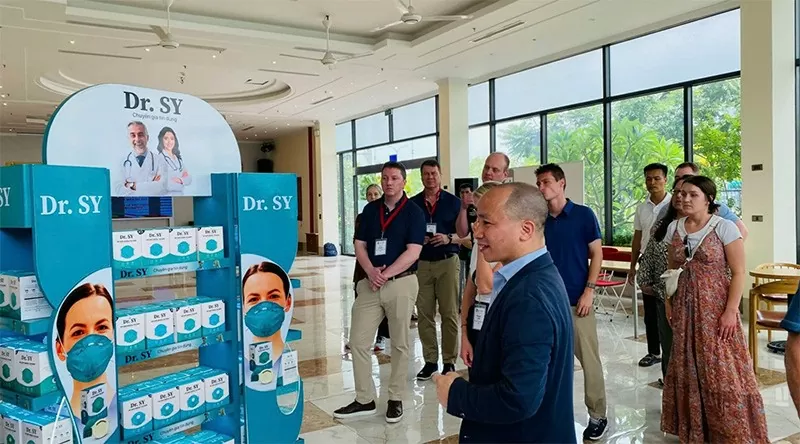 |
| Wisconsin’s researchers visit Dr. Sy's mask production area. |
This visit not only deepened the delegation's understanding of how Diligo applies cultural ethics of "Kindness and Compassion" in thought, speech, and action but also offered an invaluable opportunity to learn from Vietnamese businesses and explore potential avenues for collaboration.
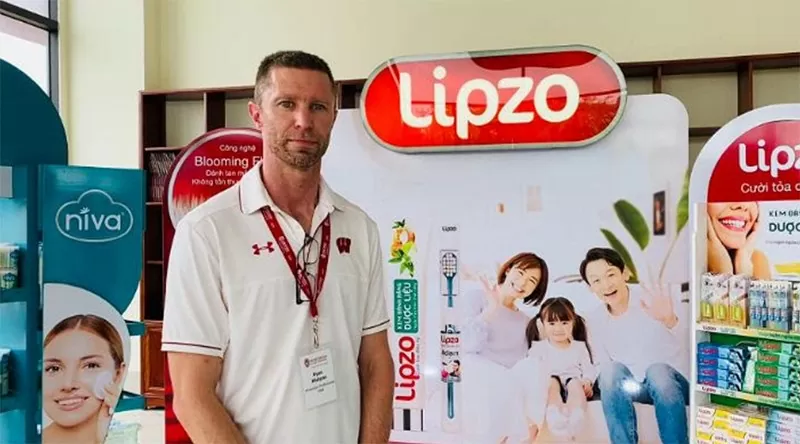 |
| Mr. Ryans shares his feelings after the trip |
Diligo’s unique culture, coupled with its widely distributed "Kindness from the Heart" products across the country, along with extensive experience in production and export to demanding markets such as the U.S., Europe, Japan, Dubai, and South Korea, made it an ideal destination for the research delegation. This combination of ethical business practices and international market influence led the delegation to choose Diligo as the main site for their visit during their business trip to Asia.
| TIN LIÊN QUAN | |
| National Assembly deputies discuss bill on corporate income tax | |
| NVIDIA to build AI research and data centres in Vietnam: National Innovation Centre | |





